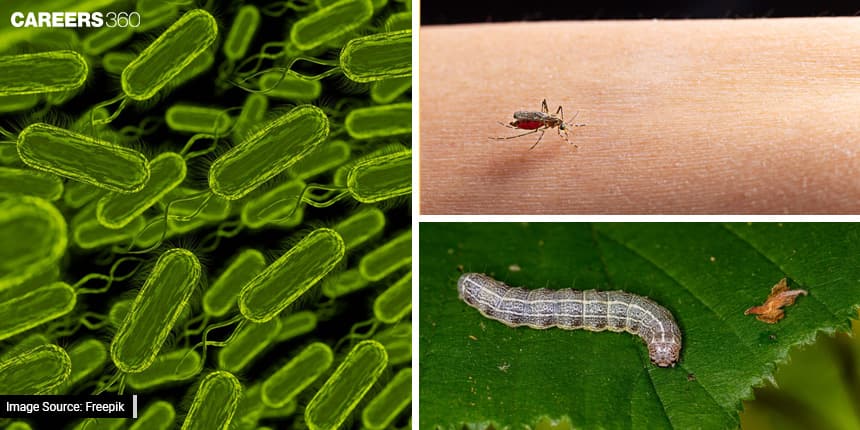How Do Parasites Survive By Exploiting Other Organisms?
Nature is full of complex relationships, and one of the most intriguing is the parasitic relationship. In these interactions, an organism, the parasite, benefits at the expense of another organism, the host. Parasites come in various forms, from tiny bacteria to large animals, and can be found in nearly every ecosystem on Earth. While parasitism might seem like a one-sided exploitation, it plays a crucial role in maintaining the delicate balance of ecosystems. In this article, we'll delve into the world of parasitic relationships, exploring their diversity and significance in nature.
This Story also Contains
- Forms of Parasitism
- Consequences of Parasitism
- Ethics of Parasitism

Forms of Parasitism
Parasitic relationships are diverse and can be classified into various categories based on the organisms involved and the nature of the interaction. Here are some of the common forms of parasitism:
Endoparasites
- Definition: Endoparasites live inside the host's body, often in organs or tissues.
- Examples: Tapeworms in the intestines and Plasmodium species causing malaria in humans.
Ectoparasites
- Definition: Ectoparasites live on the surface of the host's body.
- Examples: Fleas, ticks, and lice infest mammals.
Brood Parasitism
- Definition: Brood parasites lay their eggs in the nests of other species, leaving the host to raise their young.
- Examples: The common cuckoo, which lays eggs in the nests of other bird species.
Social Parasitism
- Definition: Social parasites infiltrate the colonies or societies of other social organisms, such as ants or bees, and exploit their resources.
- Examples: The slave-making ant, which enslaves workers of other ant species.
Kleptoparasitism
- Definition: Kleptoparasites steal food or resources from other organisms.
- Examples: Seagulls stealing fish from other seabirds, or parasitic wasps stealing prey from other wasps.
Hemiparasitism
- Definition: Hemiparasites are plants that parasitise other plants by tapping into their root systems for nutrients.
- Examples: Mistletoe, which attaches to trees and shrubs to obtain water and nutrients.
Also Read: "Extremophiles: Microorganisms that Thrive in Extreme Environments"
Consequences of Parasitism
Parasitic relationships have far-reaching consequences for both the host and parasite species, as well as the ecosystems they inhabit. Here are some key points to consider:
For the Host
- Health Impacts: Parasites can cause a range of health issues in their hosts, from mild discomfort to severe disease.
- Reduced Reproductive Success: Some parasites can reduce the host's ability to reproduce or care for their offspring.
- Altered Behaviour: Parasites may manipulate the behaviour of their hosts, making them act in ways that benefit the parasite's survival and reproduction.
For the Parasite
- Dependence on the Host: Parasites rely on their hosts for essential resources, making their own survival tightly linked to the health of the host.
- Transmission Strategies: Parasites have evolved various strategies to ensure their offspring are transmitted to new hosts, such as complex life cycles and specialised transmission organs.
- Co-evolution: Parasites often co-evolve with their hosts, leading to a constant arms race as hosts develop defences and parasites evolve countermeasures.
For Ecosystems
- Biodiversity: Parasitic relationships can contribute to the diversity of species within an ecosystem, as they can create selective pressures that drive the evolution of host defences.
- Population Regulation: Parasites can play a role in regulating host populations and preventing the overpopulation of certain species.
- Energy Flow: Parasitism affects the flow of energy and nutrients through ecosystems as parasites syphon resources from their hosts.
Ethics of Parasitism
While parasitic relationships are often portrayed as negative, it's important to recognise that they are a natural part of ecosystems and have been integral to the evolution of life on Earth. In some cases, parasites can even benefit their hosts indirectly by contributing to the host's fitness through selective pressure. It is crucial to approach these interactions with a balanced perspective.
Key Points
- Parasitism is a fundamental ecological interaction.
- Understanding parasitism is vital for preserving biodiversity and the health of ecosystems.
- Some parasites can provide valuable insights into ecological and evolutionary processes.
Parasitic relationships are a complex and often underappreciated facet of the natural world. These interactions, though seemingly one-sided, play a critical role in shaping the diversity and dynamics of ecosystems. The study of parasites and their relationships with hosts offers valuable insights into the intricacies of life on Earth, from the evolution of species to the balance of nature. While parasites may exploit their hosts, they are an integral part of our ecology, contributing to the resilience and adaptability of ecosystems. Understanding and appreciating these relationships is the key to maintaining the health and diversity of our planet.
Also Read: "Bioluminescence: The Science of Light in Living Organisms"
Applications for Admissions are open.
As per latest syllabus. Physics formulas, equations, & laws of class 11 & 12th chapters
JEE Main Important Chemistry formulas
Get nowAs per latest syllabus. Chemistry formulas, equations, & laws of class 11 & 12th chapters
JEE Main high scoring chapters and topics
Get nowAs per latest 2024 syllabus. Study 40% syllabus and score upto 100% marks in JEE
JEE Main Important Mathematics Formulas
Get nowAs per latest syllabus. Maths formulas, equations, & theorems of class 11 & 12th chapters
